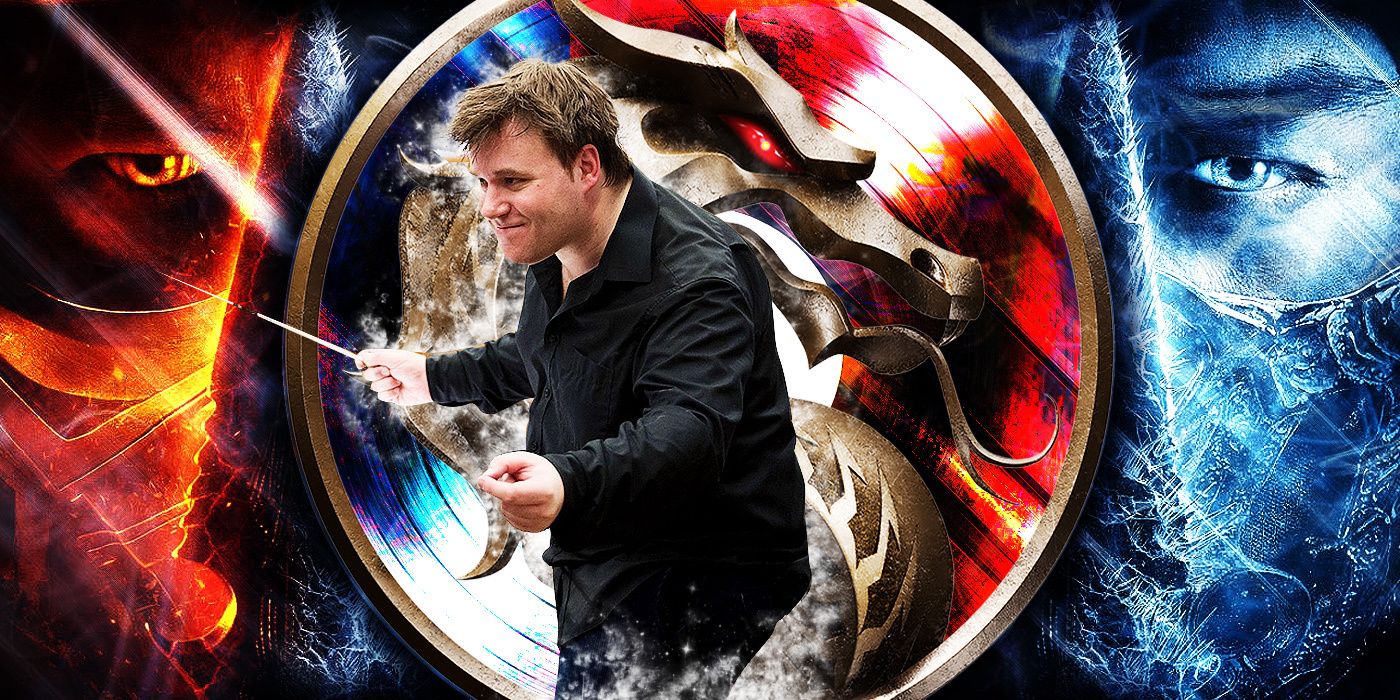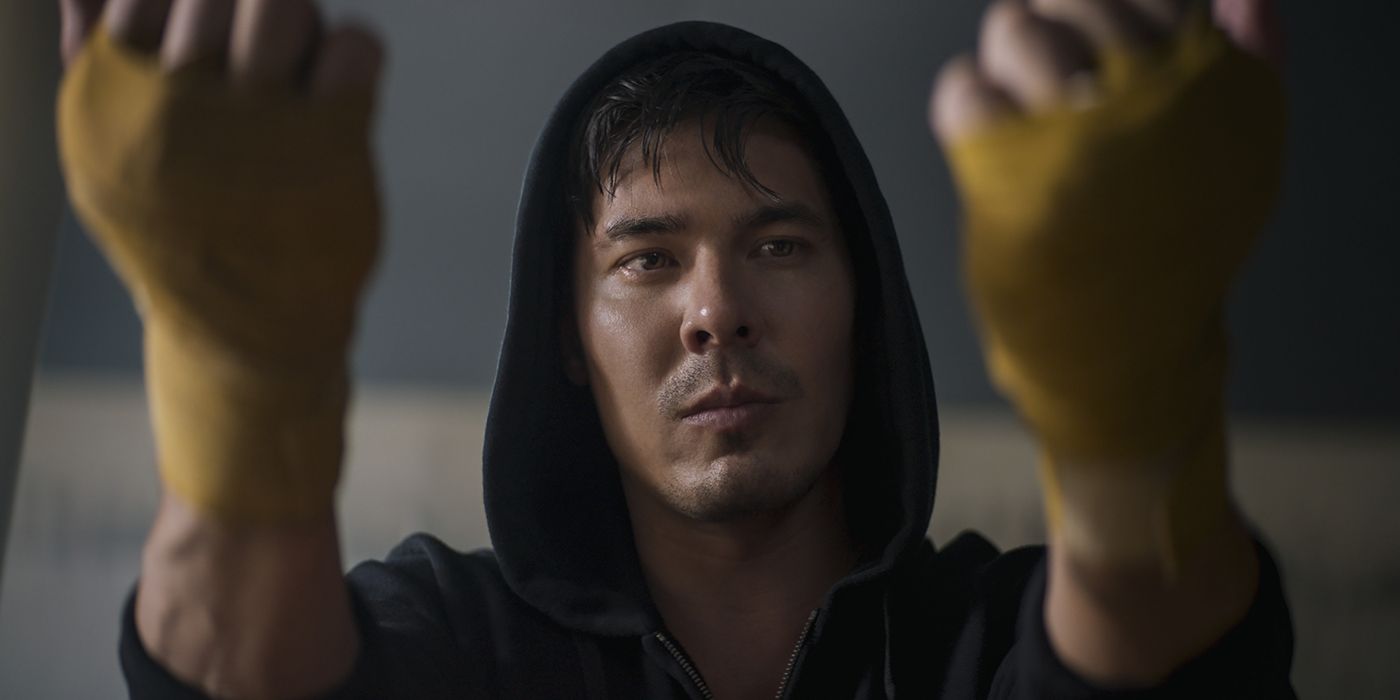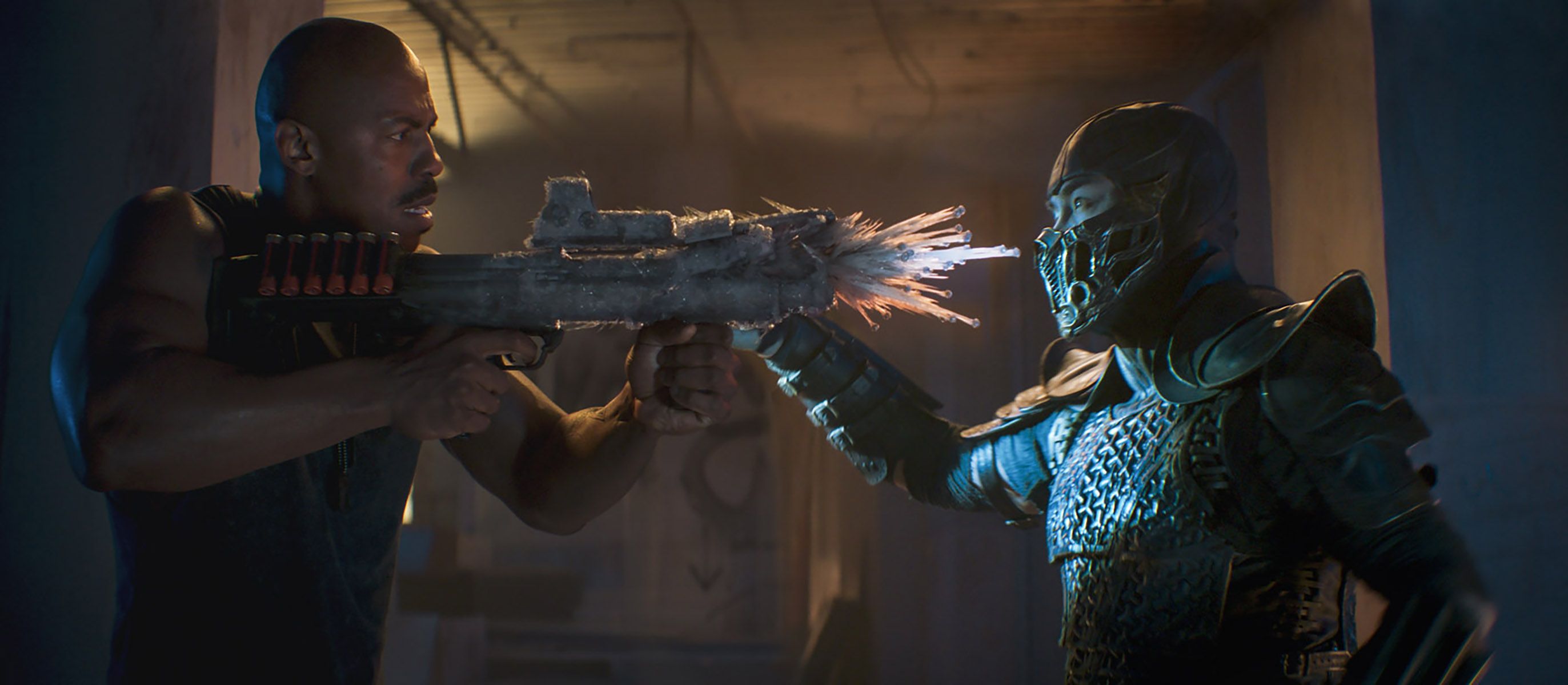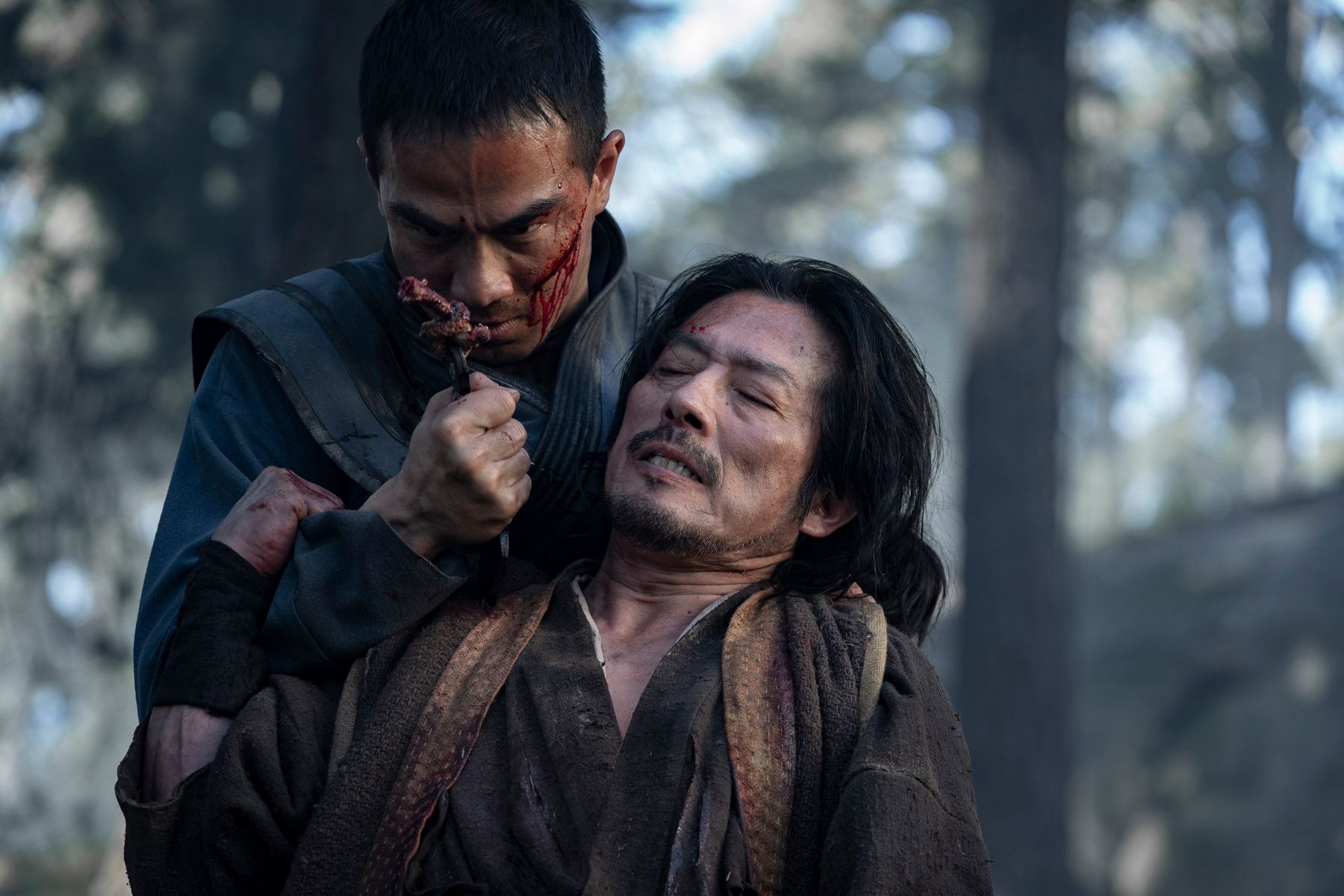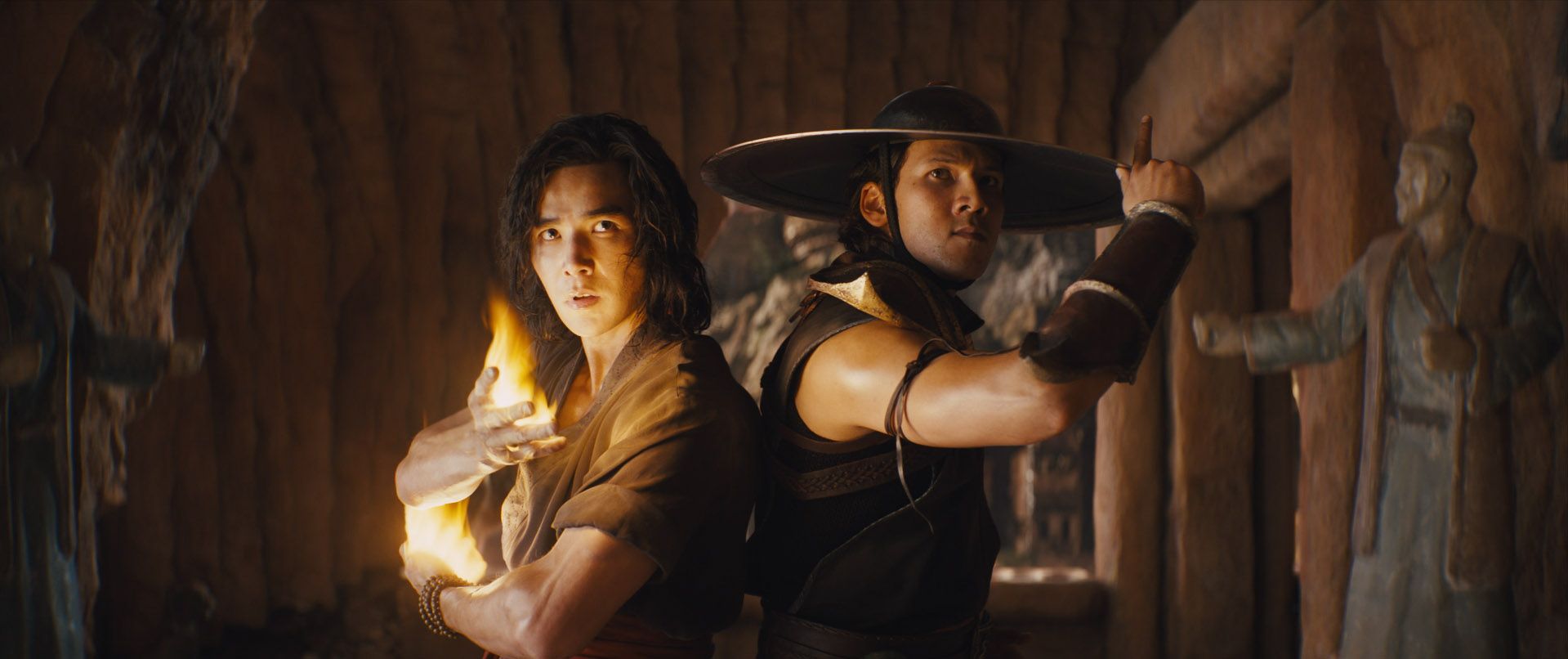When you think of Mortal Kombat you think of two things: the brutal fatalities, and “Techno Syndrome.” The song made its debut in the 1995 film adaptation of the video game franchise, and instantly became iconic. Which is why, when lauded composer Benjamin Wallfisch was first asked if he had any interest in being involved in the new Mortal Kombat movie, he knew he had to figure out how to deal with “Techno Syndrome” first.
In an exclusive interview with Collider, Wallfisch revealed that before he was even officially hired on Mortal Kombat he sat down and began experimenting with the DNA of “Techno Syndrome” to see if it could be reinvented for a new movie. That original experiment formed the bones of Wallfisch’s approach to the entire Mortal Kombat score, which uses iconic pieces of music from “Techno Syndrome” that are then rearranged, slowed down, or reconceived to serve as Easter Eggs of sorts until the full, new version – “Techno Syndrome 2021” – is unveiled towards the end of the movie.
During our discussion, Wallfisch – who has worked on franchises ranging from It to Shazam! to Blade Runner 2049 – explained how he went about creating “Techno Syndrome 2021” and how it manifested in different ways throughout the movie. He also talked about deciding where in the film to play the full version of “Techno Syndrome 2021,” the challenge of creating themes for so many iconic characters that appear in the movie, and other Easter Eggs he’s hidden throughout the score for the film. Wallfisch also discussed the challenge of recording this score remotely during the pandemic, and he even teased his next project The Starling which is a significant departure from scoring blockbusters and action movies.
Check out the full interview below. Mortal Kombat is now playing in theaters and is currently streaming on HBO Max for a limited time.
How did you first get involved with Mortal Kombat?
BENJAMIN WALLFISCH: After getting the initial phone call about the project, I wanted to do an experiment to see if some of the tunes in the iconic ‘Techno Syndrome’ could be completely reinvented, not just in terms of a remix, but actually reimagined as core material for an orchestral score. I was very aware of the responsibility that comes with scoring a movie from a game franchise so deeply embedded in pop culture and with such a huge and passionate fanbase, and Techno Syndrome is of course a huge part of the identity of Mortal Kombat. So I wanted to see if it was possible to authentically embrace that song’s DNA by reimagining elements of it in a completely different context and style, one suited to the scale of Simon McQuoid’s vision for the movie which came across so clearly in the script and the treatment I was sent. I basically said to myself – if this doesn’t work, I’m not sure if I’m the right guy to do this project.
So I spent a few days experimenting with that idea, doing weird things like slowing the melodies in Techno Syndrome to like 10% of their original speed, turning them upside down, completely re-harmonizing them and so on, and building that into a 5 minute demo which was basically one big crescendo. I played it for Simon during our first meeting, he immediately green lit it, and it kind of went from there. I loved Simon’s sense of adventure and willingness to embrace the experimental – he also had this huge ambition for the movie in terms of story, visual scale and how he wanted to build out the characters, all of which was so exciting – we hit it off straight away. I later learned he played that demo to actors on set and even during casting meetings, which blew my mind a little bit.
How much of that demo made it to the finished film? Did that kind of give you just kind of a skeleton and some bones, or did it show up fully formed in any way?
WALLFISCH: That early demo didn’t make it verbatim into the score, but its overall philosophy did for sure. For example Raiden’s Theme is the main ‘Techno Syndrome’ tune, but slowed right down, and with some very chromatic and crunchy harmonies underneath. It’s just three pitches, but when it’s played like an anthem in the brass at that new super slow tempo, with strings and choir supporting it with some unexpected chords, it felt kind of felt like Raiden. The simplicity of the theme also meant I could feed his theme through other parts of the score to give him a presence in the movie even when he’s not on screen. There are a bunch of other times you hear other interpolations of other elements of Techno Syndrome, kind of just hidden from view, there to be discovered if you listen closely – that was really fun to do.
What you're saying makes a lot of sense because it feels almost like Easter eggs embedded throughout the film, because as I was watching it, the title comes up and it doesn't go full on blast with the theme yet, but every now and then I'll be like, was that...? I thought I heard... And then it culminates later on when Cole gets his full powers, and then you get the full thing at the very end of the movie. But was there any discussion or debate over putting the full track at the beginning of the film or earlier in the movie because you knew fans would be waiting for it?
WALLFISCH: Yes we discussed that a lot, but pretty early on we decided to only hint at that iconic tune at the beginning of the movie, and have it gradually evolve as the movie progresses until it is stated in its clearest form in the huge final battle between Scorpion and Sub Zero.
There was also of course a real need for fresh new themes, and in the end there is only about 20 minutes of material in the score that in some way interpolates Techno Syndrome, either directly or indirectly (not including the end credits song). We found that was just the right amount as we didn’t want it to feel like we were overdoing it.
I think you guys paced it perfectly. If you blow it out too early, then it starts to kind of become overdone. And it also works from a story perspective because you're not getting into the Mortal Kombat of it until the grand finale really.
WALLFISCH: I guess it was more about having that feeling of nostalgia and throwback to that original iconic material throughout the score, but mostly really disguised – it’s like we gradually pull the curtain back on that iconic tune more and more throughout the movie, so it really feels like the score climaxes at the end with that super recognizable material. But by then we’ve also had like 7 other themes for the main characters which the audience will be familiar with, so when you hear the Techno Syndrome melody in its clearest form at the end, it has more context with the other characters.
There are some other slightly more geeky Easter Eggs dotted around too, unrelated to the Techno Syndrome - for example when you first see Sub Zero as Bi-Han at the beginning of the movie, you hear this crazy low distorted low drum motif, which Simon went on to call the ‘Demented Drum’. If you’re listening in a theater, that drum sound should hit the Sub speaker at around Zero dB. Literally only hardcore music nerds like me would notice things like that – but why not have fun with it?
You’ve worked on ensemble films before, and this is a big cast, but every character is someone that fans of the game will go, "I know that one.” So was there pressure on your end to feel like, oh, I've got to do some kind of signature motif or something here for each and every one of those guys?
WALLFISCH: Yes for sure. Each of the main characters - Kano, Jax, Sonya Blade, Cole Young, Liu Kang, Kung Lao, Sub-Zero, Shang Tsung, Goro, and especially Scorpion - they all had to have very distinct themes, sounds or motifs. Whenever there was a new character introduced, we wanted it to feel like there was some distinctive musical event to accompany that.
It can get crowded if you start being just an avalanche of different melodies, so sometimes a character’s theme was literally a single distinct screaming synth sound, like with Goro, or there’s a more developed melody like Scorpion’s theme which you first hear played very gently on the Shakuhachi in the opening scene of the movie, when he is Hanzo Hasashi, and then more heroically in the brass section in the ‘I Am Scorpion’ scene towards the end.
Another example of that is in the Arcana Theme, which is very much connected to Cole Young’s journey through the movie. He doesn't really become Cole Young the warrior until towards the end of the film, so you only hear the tiniest hint of it at the beginning, before it evolves into this much bigger Arcana Theme, which it itself goes on to accompany other characters in the Tournament sequence. The evolution of that tune was part of making Cole feel larger than life as a character. Also his story is all about family – both his wife and daughter, but also his ancestral lineage to Hanzo Hasashi, something he discovers gradually – all of that had to be wrapped up into his character theme too, so it could properly climax at the end when he joins forces with Scorpion to defeat Sub-Zero.
Well, and to that end, I wanted to ask about the finale. Before you get to the Scorpion fight, you have, I think it's three different fights going on in three different locations. Each of the characters that have their own themes and motifs, how did you go about tackling that one? Because it couldn't just be kind of wall-to-wall action sound for the whole thing.
WALLFISCH: Yeah, it was a really interesting challenge, and that sequence went through a lot of changes editorially to discover the right approach, which gave me an opportunity to try some different directions musically. In the end it was all about making sure that there was a sense of musical glue and logic as we move between locations, characters, and fighting styles.
The main underlying idea for me was our Earth Realm heroes decide to engage in the Mortal Kombat tournament completely on their own terms, and motivated by their own personal vendettas. Liu Kang wants to avenge the recent death of his spiritual brother Kung Lao at the hands of Shang Tsung, Sonya Blade has a score to settle with Kano, as does Jax with Reiko. So rather than just calling out their individual character themes, I could unite them all with that singular idea – that they are fighting as a team, but still completely on their own terms.
There’s an almost nervous energy to Cole when he is fighting in that final tournament, because subconsciously at that stage he must know he’s actually fighting on behalf of his ancestor Scorpion, and has only just discovered his Arcana. Contrast that with the spectacular unleashing of one of the game’s most iconic fatalities with Liu Kang’s Fire Dragon, in the same sequence. So I guess in the end it was all about running with the spectacular fight choreography and intensity of the violence, whilst at the same time also playing off where each character is in their own personal development.
Above all, Simon’s wanted the music in that sequence to sound fun. Like you as an audience are right in the middle of one of the most challenging levels of the game, and winning.
It feels like this score has something similar in the DNA of it to Blade Runner 2049, which is one of my favorite works of yours. I was wondering if you learned anything through working with Hans Zimmer on that film that maybe carried over and influenced how you approached the kind of techno score of this one?
WALLFISCH: Hans has always been not only a close friend but also a mentor figure for me; both from a musical and production standpoint, and also in terms of how he approaches story and character. Working on Blade Runner 2049 was so inspiring for so many reasons, not least because the score is 100% electronic, something I don’t often get to do. And for sure, the electronic element in Mortal Kombat is really important, particularly for the characters from OutWorld – Shang Tsung, Mileena, Reptile, Kabal, Nitara – there’s almost no orchestra when they are driving a scene.
Simon wanted Outworld to sound like a terrifying alien landscape, and I wrote a suite early on trying to imagine the sound of Shang Tsung sucking a person’s soul - because why not!? I did a ton of experiments with breath and other vocal elements and completely reinventing them electronically. Elements of that suite can be heard in all the OutWorld characters.
In terms of the full remix for the end credits, ‘Techno Syndrome 2021’, my priority there was to try and make a track that not only celebrated the fans of Mortal Kombat, but also celebrated how the original track was an important part of lighting the touchpaper for EDM in general. Techno was a little more underground back in the 90s and that track kind of blew it up into the mainstream. That’s why you hear elements of Techno, House, Trance and even Dubstep in that single three minute track – I wanted it to feel like a journey through a few different subgenres of EDM, as a celebration of Techno Syndrome’s legacy, really as a huge catalyst in the rise of dance music at the beginning.
Was this recorded remotely during the pandemic? How did you go about the whole process of actually making this score?
WALLFISCH: Yes, and we had to stack it very gradually, using an incredible group of core musicians in Sydney. We could only have about 25-30 players in the room at one time, for a score written for an orchestra and choir of 120, playing full tilt. So that meant a lot of overdubs and a lot of takes – we actually broke 10,000 takes in the end which I think might be some kind of record! The whole recording process took about four weeks, where it might normally take about 12 days without the Covid restrictions. Those musicians were just amazingly patient and heroic in the way they went through that painstaking process, and our hope is the audience wouldn’t be able to tell the difference.
It seems like a lot of composers have been forced to do that over the last year. I'll be curious to see if any techniques kind of carry over into the process once things go back to normal.
WALLFISCH: I was just so happy to see musicians in the room playing together, after such an unbelievably hard year for orchestras around the world. Musicians need every ounce of support we can give them, and with the vaccine rolling out it’s so great to see the recording session scene gradually picking up again, with ever bigger orchestras. I’m not sure if the extremes we had to go to record this particular score during the height of Covid will carry over into the future, but who knows. I’m just eternally grateful to the whole team who made it happen under such difficult circumstances.
A lot of your work is a little boundary pushing, it's progressive, it's kind of forward-thinking. And I was curious, is there one particular idea of yours in the past maybe that was just kind of like your wildest idea that you thought the director would never agree to, that you finally got someone to say yes to and got that on a track?
WALLFISCH: I find with a lot of the directors that the process of exploring more experimental ideas itself can be more important than whether they end up in the finished score – that journey of kind of playing with fire often sparks bigger conversations about story or character, or triggers solutions that might otherwise remain hidden.
That’s part of the reason I like to write suites away from picture at the beginning of the process, responding to the script, or examining a particular character or idea – those suites kind of allow a canvas where it’s ok to push things to extremes, and figure out what does and doesn’t stick before you get into the more granular process of scoring to picture.
That said, I guess some of the wilder ideas that have made it into the final score might include some of the electronic sound design in The Invisible Man, where Leigh [Whannell] wanted me to go as hard as possible to contrast with the more reflective and tense orchestral music in that score. Also the time when James Marsh green-lit the idea of turning Tchaikovsky’s ‘Sugarplum Fairy’ into a raucous cue for Big Band, or when the Hellboy filmmakers let me write a Djent-inspired score.
When you describe those kinds of ideas in the abstract it all sounds a bit nuts, but it just felt right for those movies at the time. In the end you always start with a blank canvas and it’s almost like a conversation with the film itself – a kind of give and take where things are very clearly accepted or rejected. I guess part of it is also I try my best not repeat myself.
Speaking of not repeating yourself, I'm fascinated by The Starling coming up. I was wondering what you could tell me about that.
WALLFISCH: The Starling is a really beautiful and moving film by my friend Ted Melfi, who directed Hidden Figures. It stars Melissa McCarthy, Chris O'Dowd and Kevin Kline who are all incredible in the movie. It's a very personal story and manages to be both deeply heartbreaking and genuinely funny, often in the same scene. Ted’s movies have that kind of unique depth - he has this uncanny ability to effortlessly move between tragedy and humor. The humor creeps up on you and sort of prepares you for things which are much harder to take, and it’s all very nuanced and meaningful. It was a very special project to be a part of and I can’t wait for people to see it.

